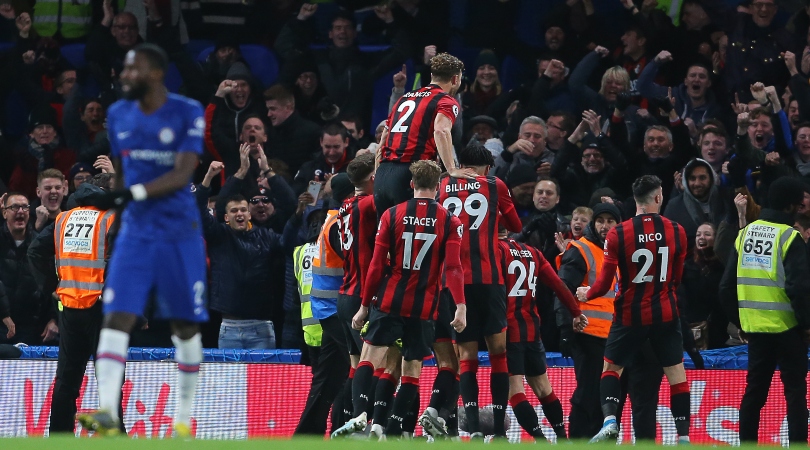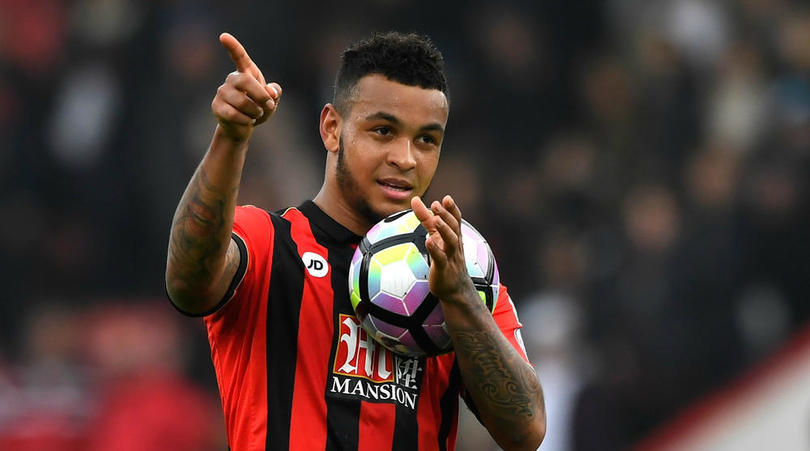Eddie Howe deserves more credit for his ability to turn around Bournemouth's winless slumps
The Cherries' bad runs of form will always cause concerns, but the fact Howe can revive his team without dipping into the transfer market can't be ignored

The cameras caught Eddie Howe at full-time. Eyes shut, fists clenched. He broke to shake Frank Lampard’s hand, but given the increasingly gloomy tone of Howe’s press-conferences in recent weeks, he was entitled to that little moment of relief as the whistle blew.
Had Bournemouth lost at Stamford Bridge, it would have been their sixth defeat in a row. Most recently they’d be humbled on their own pitch by Liverpool – no shame in that – but that was a run which also involved a much-worse-than-it-sounded 3-2 loss to Tottenham, a home defeat to Wolves and a dreadful 1-0 calamity at the hands of ten-man Crystal Palace at Selhurst Park.
Along with that baggage, they also brought a near-total injury list to Chelsea. Nathan Ake and Callum Wilson were the headline absentees, fundamental components from the team’s front and back, but Howe was also forced to do without Steve Cook, Charlie Daniels, Harry Wilson and – as he has done for many, many months – David Brooks and Lloyd Kelly.
There’s another article to be written about this game, one which recognises the many Chelsea flaws behind the result, but Howe’s patchwork Bournemouth were still the story. Not that they did anything unusual. They defended deep, often with eight, nine or even 10 players behind the ball, and sprung out on the counter-attack at every chance. Ryan Fraser played ever so well. So too, on return from injury, did Josh King.
Howe has faced criticism in recent weeks. Rightly so, because not only has the calibre of performance been insufficient, but these barren runs have been a feature of every Bournemouth season since their promotion. After the Palace game, Howe also admitted that the defeat was his ‘lowest’ point at the club; as well as a reflection on the result itself, that was probably despondency drawn from the situation’s familiarity.
But if Howe’s reputation is queried on the basis of allowing these slumps, then it’s also right to recognise his capacity for curing them. Not with the transfer market or some other synthetic means, but by drawing a response from within his squad - and this was probably the most impressive example of that.
It will only hold real weight if the win over Chelsea isn’t a one-off, of course, but even in isolation the result was a reminder of why Howe is often spoken of in such flattering terms. On a player-for-player basis, he’s able to extract so much. Logically, the trip to Stamford Bridge should have been a hiding to nothing.
Get FourFourTwo Newsletter
The best features, fun and footballing quizzes, straight to your inbox every week.
Shattered confidence and without his best centre-half.
Goal-shy and without not only his best forward in Wilson, but also one of the players around whom this team's whole attacking identity is built.
But there were two really encouraging observations to take away from Saturday: firstly, that Bournemouth were depending on all sorts of new combinations in every part of the pitch (Mepham-Francis, Lerma-Billing-Gosling, Stacey-Cook). Secondly, none of those partnerships revealed how new they actually were; they functioned as if developed over seasons rather than days.
Ultimately, the success of Bournemouth’s performance was not just in its resilience, but in its overall functionality. The balance between defence and attack was almost perfect. When the ball was pressed, it was done at the right time, with the right numbers, and without leaving gaps elsewhere. Billing was good, Lerma was excellent, the entire back four and goalkeeper was outstanding.
What this describes, really, is Howe’s command of the training ground. As has been proven time and again, some head coaches are prisoners of their own bad form. Once it arrives, they’re incapable of banishing it. Not only does Howe seem to be able to do exactly that every year but, in this instance, he’s managed to carry out that purge in spite of almost a dozen injuries. Essentially, he’s had to do it with inferior players – or at least those who he chooses less often – and with parts which aren’t perfect for their given roles. Josh King isn't a lone forward. Lewis Cook definitely isn't a wide midfielder. And yet it was made to work.
That’s the context within which to imagine Bournemouth’s long week of drills and analysis sessions, instruction and shadow play. Not unusual in itself, but certainly in the result it produced. That success depicts an ability to almost cleanse a squad; to deal with the sulks and the self-pity which result from losing, and replace them with more optimistic energies. That's very rare.
The conversation about why this happens in the first place is still pertinent, but that doesn’t make Howe’s consistent capacity to revive his team any less remarkable. He has a smart mind, certainly. He's young and English, too, and that guarantees a certain level of affection. But what an excellent communicator Eddie Howe must be to keep repeating this trick and keep reimagining what Bournemouth can be.
While you're here, why not take advantage of our brilliant subscribers' offer? Get the game's greatest stories and best journalism direct to your door for only £9.50 every quarter. Cheers!
NOW READ...
EXCLUSIVE Brendan Rodgers explains how managing Celtic changed him as a manager at Leicester
QUIZ Can you name the top four at this stage of every Premier League season?
GUIDE Premier League live stream best VPN: how to watch every game from anywhere in the world
Seb Stafford-Bloor is a football writer at Tifo Football and member of the Football Writers' Association. He was formerly a regularly columnist for the FourFourTwo website, covering all aspects of the game, including tactical analysis, reaction pieces, longer-term trends and critiquing the increasingly shady business of football's financial side and authorities' decision-making.

